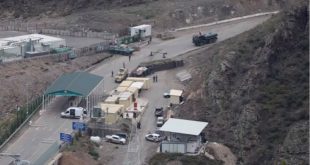Swiss voters are casting ballots in a referendum on a proposed “carbon dioxide law” that would hike fees and taxes on fuels that produce greenhouse gases, as their Alpine country experiences an outsized impact from the fallout of climate change.
The proposal would revise and strengthen an existing law that aims to reduce CO2 emissions by 2030. It’s one of several measures facing voters nationwide on Sunday in the latest referendums in Swiss democracy, which gives the public a direct say in policymaking.
Many in Switzerland, home to melting glaciers and high-altitude towns, needs to act fast: The country has faced a rise in temperatures that is twice as fast as the global average, the government says. Greenhouse gases — notably carbon dioxide — are seen as the primary culprit.
The law, if approved by voters and finalized in parliament, would enact new taxes on CO2-generating fuel and natural gas, as well as on airline tickets, and raise fees on the pump price of gasoline. Exemptions would be given to people who reduce their C02 emissions.
Such revenues would go into a “climate fund” to support activities like the rollout of electric buses, financing for Swiss firms to innovate climate-friendly technologies, new heating systems, and aid for areas vulnerable to the impact of climate change — like rural areas hit by mudslides.
Polls suggest that most voters back the measure, but the margin narrowed in May. Most Swiss cast ballots by mail, and preliminary results were expected by Sunday afternoon.
Critics say the measure would be ineffective since Switzerland’s carbon dioxide emissions amount to a mere 0.1 percent of the global tally — so the problem is far bigger than what the country alone can combat.
Plus, they say the impact of the measure would cost too much and weigh heavily on a wide array of people, including lower- and middle-income families, drivers, young travelers, and both homeowners and renters.
The Swiss government, which backs the proposal, and other supporters insist that the cost of inaction would be even higher, and say the measure could underpin climate-friendly innovations and create more green jobs.
Among other issues on nationwide ballots is a referendum on the government’s COVID-19 law, which generated a surge in state spending that critics say was too expensive: A vote against the law could invalidate emergency state support that has already gone out to — and continues to go to — over 100,000 enterprises and more than 1 million people in the country of 8.5 million.
Polls suggest a relatively tight contest over an initiative that aims to improve the quality of drinking water in Switzerland would make it harder for farmers to get state subsidies if they use some types of pesticides and antibiotics.
Voters also appeared set to green-light the government’s push to grant police enhanced surveillance powers and take preventative action to help fight terrorism.
 Alghadeer TV Alghadeer TV
Alghadeer TV Alghadeer TV
